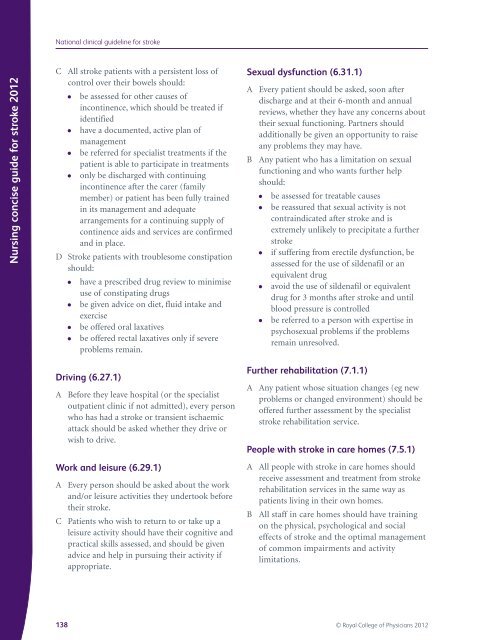national-clinical-guidelines-for-stroke-fourth-edition
national-clinical-guidelines-for-stroke-fourth-edition
national-clinical-guidelines-for-stroke-fourth-edition
You also want an ePaper? Increase the reach of your titles
YUMPU automatically turns print PDFs into web optimized ePapers that Google loves.
Nursing concise guide <strong>for</strong> <strong>stroke</strong> 2012<br />
National <strong>clinical</strong> guideline <strong>for</strong> <strong>stroke</strong><br />
C All <strong>stroke</strong> patients with a persistent loss of<br />
control over their bowels should:<br />
● be assessed <strong>for</strong> other causes of<br />
incontinence, which should be treated if<br />
identified<br />
● have a documented, active plan of<br />
management<br />
● be referred <strong>for</strong> specialist treatments if the<br />
patient is able to participate in treatments<br />
● only be discharged with continuing<br />
incontinence after the carer (family<br />
member) or patient has been fully trained<br />
in its management and adequate<br />
arrangements <strong>for</strong> a continuing supply of<br />
continence aids and services are confirmed<br />
and in place.<br />
D Stroke patients with troublesome constipation<br />
should:<br />
● have a prescribed drug review to minimise<br />
use of constipating drugs<br />
● be given advice on diet, fluid intake and<br />
exercise<br />
● be offered oral laxatives<br />
● be offered rectal laxatives only if severe<br />
problems remain.<br />
Driving (6.27.1)<br />
A Be<strong>for</strong>e they leave hospital (or the specialist<br />
outpatient clinic if not admitted), every person<br />
who has had a <strong>stroke</strong> or transient ischaemic<br />
attack should be asked whether they drive or<br />
wish to drive.<br />
Work and leisure (6.29.1)<br />
A Every person should be asked about the work<br />
and/or leisure activities they undertook be<strong>for</strong>e<br />
their <strong>stroke</strong>.<br />
C Patients who wish to return to or take up a<br />
leisure activity should have their cognitive and<br />
practical skills assessed, and should be given<br />
advice and help in pursuing their activity if<br />
appropriate.<br />
Sexual dysfunction (6.31.1)<br />
A Every patient should be asked, soon after<br />
discharge and at their 6-month and annual<br />
reviews, whether they have any concerns about<br />
their sexual functioning. Partners should<br />
additionally be given an opportunity to raise<br />
any problems they may have.<br />
B Any patient who has a limitation on sexual<br />
functioning and who wants further help<br />
should:<br />
● be assessed <strong>for</strong> treatable causes<br />
● be reassured that sexual activity is not<br />
contraindicated after <strong>stroke</strong> and is<br />
extremely unlikely to precipitate a further<br />
<strong>stroke</strong><br />
● if suffering from erectile dysfunction, be<br />
assessed <strong>for</strong> the use of sildenafil or an<br />
equivalent drug<br />
● avoid the use of sildenafil or equivalent<br />
drug <strong>for</strong> 3 months after <strong>stroke</strong> and until<br />
blood pressure is controlled<br />
● be referred to a person with expertise in<br />
psychosexual problems if the problems<br />
remain unresolved.<br />
Further rehabilitation (7.1.1)<br />
A Any patient whose situation changes (eg new<br />
problems or changed environment) should be<br />
offered further assessment by the specialist<br />
<strong>stroke</strong> rehabilitation service.<br />
People with <strong>stroke</strong> in care homes (7.5.1)<br />
A All people with <strong>stroke</strong> in care homes should<br />
receive assessment and treatment from <strong>stroke</strong><br />
rehabilitation services in the same way as<br />
patients living in their own homes.<br />
B All staff in care homes should have training<br />
on the physical, psychological and social<br />
effects of <strong>stroke</strong> and the optimal management<br />
of common impairments and activity<br />
limitations.<br />
138 © Royal College of Physicians 2012


